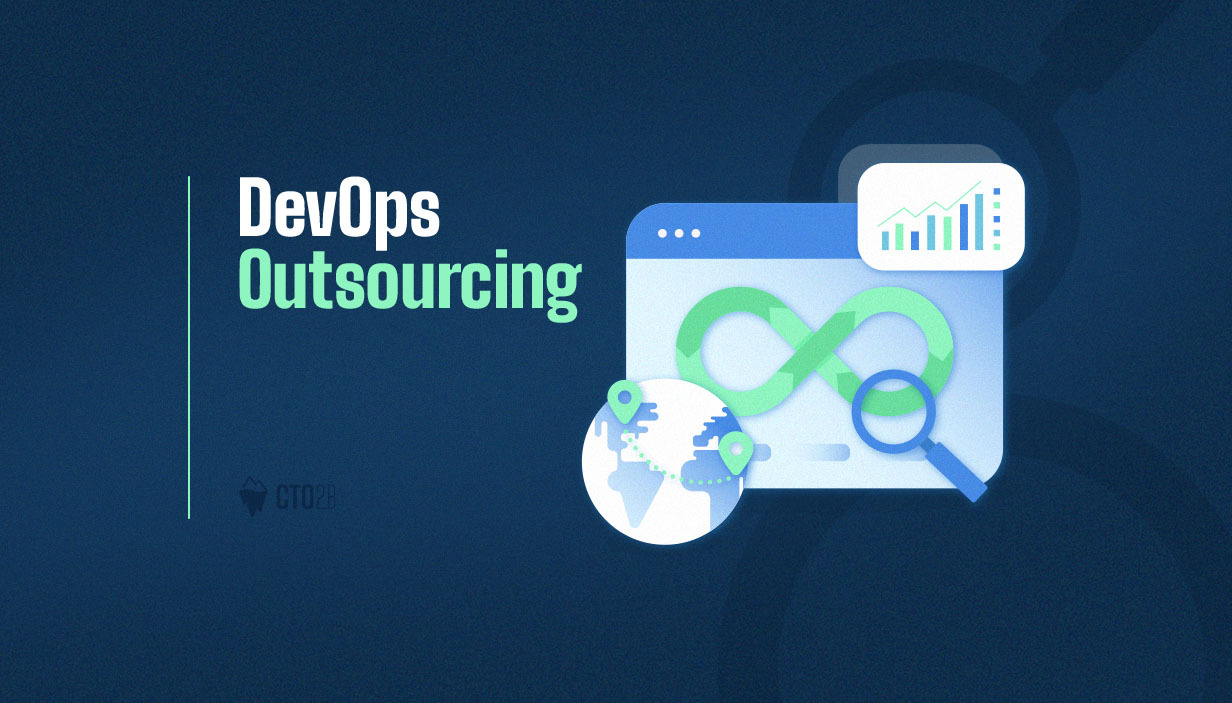DevOps helps teams ship faster, collaborate better, and build more reliable systems—but building an in-house team takes time, money, and effort.
That’s where DevOps outsourcing comes in. It gives you access to skilled DevOps professionals, a global talent pool, and the tools to optimize costs while staying agile.
In this guide, you’ll learn what DevOps outsourcing is, why it works, and how to choose the right partner, especially if you’re scaling fast or need specialized expertise without the overhead.
What is DevOps Outsourcing?
DevOps outsourcing is the practice of partnering with external specialists or agencies to manage, automate, and optimize your development and operations workflows.
Instead of relying solely on internal resources, you leverage experienced professionals to implement best practices, manage infrastructure, and streamline deployment pipelines, with CI/CD pipelines being a key part of DevOps workflows.
DevOps outsourcing can also help optimize dev and testing environments for greater efficiency.
DevOps outsourcing vendors and outsourcing providers offer a wide range of services and expertise. Outsourcing can cover a range of services, from cloud infrastructure management and DevOps automation to cloud migration and cloud compliance.
What a DevOps Workflow Looks Like (and Why It Matters)
A solid DevOps workflow helps you build and release software faster, with fewer errors. It includes things like continuous integration, automated testing, and smooth deployment—so code moves safely from development to production.
Outsourcing DevOps makes this easier. With the right DevOps services, you can simplify your process, cut out manual steps, and get help from skilled DevOps professionals who’ve done it before.
Many companies that use an outsourced team see shorter release cycles, fewer issues in production, and more time to focus on their product. A well-planned workflow lets you deliver better software—faster and with more confidence.
Why Consider DevOps Outsourcing?
Access to Top Talent and Expertise
The demand for skilled DevOps professionals is high, and hiring them in-house can take time. Outsourcing gives you instant access to a global talent pool with real-world experience across industries and cloud platforms.
An outsourced team brings in specialized expertise that can strengthen your security, speed up delivery, and improve communication across your teams.
Cost Savings and Flexibility
Hiring and training full-time DevOps staff can be expensive. Outsourcing allows you to scale resources up or down as needed, optimizing costs without sacrificing quality. Some outsourcing models even let you pay by the hour, giving you additional flexibility in managing costs. You can also benefit from cloud cost optimization strategies implemented by experts.
Focus on Core Business Objectives
When DevOps is handled by a trusted external partner, your internal team can focus on product development, customer experience, and growth.
A good outsourcing partner also helps you build a roadmap for DevOps capabilities that align with your business goals.
Faster Time-to-Market
Experienced providers come with ready-to-use tools, automation, and workflows.
That means less setup time, fewer errors, and faster delivery of new features. If speed is a priority, outsourcing helps you move faster without sacrificing quality.
In-House DevOps vs. Outsourcing: Pros and Cons
Benefits of In-House DevOps
- Complete control over every aspect of your environment
- Deep understanding of your business context
- Direct collaboration with product and engineering teams
Drawbacks of In-House DevOps
- High recruitment and retention costs
- Limited exposure to diverse tools and practices
- Potential for resource bottlenecks
Benefits of Outsourced DevOps
- Immediate access to a broad talent pool
- Expertise in the latest tools, such as DevOps automation and AI gateways
- Flexible scaling and cost efficiency
Drawbacks of Outsourced DevOps
- Less direct oversight
- Potential communication and alignment challenges
- Working with external teams can introduce potential issues, such as miscommunication or project delays, making proactive management essential.
- Need for clear security and compliance agreements
DevOps Roles and Responsibilities
DevOps isn’t just one role, it’s a mix of skills across development, operations, and QA. At the center of it all are DevOps engineers, who help teams ship code faster and keep systems running smoothly.
They’re responsible for:
- Setting up and managing CI/CD pipelines
- Automating testing and deployment
- Monitoring system performance and fixing issues
- Managing infrastructure using tools like Infrastructure as Code (IaC)
- Ensuring data security, compliance, and uptime
They also work closely with developers, IT, and business teams, so direct communication and alignment are key.
By outsourcing DevOps, you get access to a competent team with the right mix of technical expertise and real-world experience.
That means fewer blockers, more operational efficiency, and a better foundation for growth, especially if you’re scaling fast or don’t have time to build a full internal team.
Types of DevOps Outsourcing Services
DevOps Consulting
Short-term engagements to assess your current workflows, recommend improvements, or implement specific solutions like cloud compliance. These consulting engagements often begin with defining clear objectives and project scope to ensure alignment and successful outcomes.
Staff Augmentation
Bring in one or more dedicated DevOps engineers to work alongside your internal team. Ideal for short-term projects, scaling during a product launch, or filling skill gaps in cloud services, configuration management, or DevOps operations.
Dedicated Teams / Managed Services
Partnering with a provider to manage your entire DevOps function, from cloud infrastructure management to ongoing support and optimization.
How to Outsource DevOps Effectively
Step 1: Define Your Goals and Scope
Identify which areas you want to outsource—such as cloud migration, access control management, or automation. Set clear objectives and success criteria. Consider whether your DevOps workflows require expertise in specific technologies, such as Python, when defining your goals.
Step 2: Evaluate and Choose the Right Vendor
Look for partners with proven expertise, strong client references, and experience in your industry. Assess their technical stack and how well they understand your compliance needs.
Step 3: Assess Security and Compliance
Ensure your partner follows best practices for data protection, access control, and regulatory compliance. Leverage solutions like cloud compliance and access control management.
Additionally, consider using IaC (Infrastructure as Code) to automate and manage infrastructure securely and efficiently, supporting consistent compliance and security standards.
Step 4: Formalize the Partnership
Draft a clear contract outlining scope, deliverables, timelines, pricing, and security requirements. Define communication protocols and escalation paths.
Step 5: Ensure Communication and Collaboration
Establish regular check-ins, transparent reporting, and shared tools to keep all stakeholders aligned.
Best Practices for DevOps Outsourcing
To get real value from outsourcing, start by setting clear goals and KPIs. Whether you’re focused on faster software releases, better cloud migration, or improving software quality, alignment is key.
Choose a DevOps vendor with experience in your industry and your tech stack, especially if you’re working with cloud infrastructure, deployment automation, or need to meet relevant regulations like PCI DSS.
Make sure your outsourced development team can seamlessly integrate with your internal teams. Regular updates and open communication go a long way in avoiding delays or confusion.
Lastly, stay flexible. A good partner should adapt as your needs grow, supporting continuous delivery, cloud optimization, and ongoing DevOps implementation.
Common Mistakes in DevOps Outsourcing
Even with the best intentions, teams can run into trouble when outsourcing DevOps. One of the most common mistakes is not setting clear goals or KPIs. Without them, it’s easy for teams and providers to get out of sync.
Another issue is choosing a DevOps vendor without the right industry expertise or experience with your tech stack. This can lead to weak DevOps implementation, failed rollouts, or compliance gaps—especially when dealing with cloud infrastructure or deployment automation.
Lack of transparency is another risk. If communication breaks down, small issues turn into costly delays. Missed updates, unclear responsibilities, or hidden costs can quickly impact your DevOps operations and software development timelines.
To avoid these mistakes, focus on alignment from day one. Work with a trusted partner who understands your goals, communicates clearly, and has a proven track record with successful DevOps projects.
Key Considerations and Risks in DevOps Outsourcing
Outsourcing DevOps can unlock a lot of value, but it also comes with risks if not handled carefully. Here’s what to watch for:
Security and Compliance Risks
Sharing data with external providers can raise concerns around cloud compliance, PCI DSS, and other relevant regulations. Work with partners who follow strict security and compliance measures, and who understand your industry’s requirements.
Loss of Control & Communication
With an external team, there’s always a risk of misalignment. Avoid surprises by documenting everything clearly and keeping open communication channels between your development and operations teams.
Cultural Fit
Cultural alignment is often overlooked, but it’s one of the most important DevOps success factors. When your outsourced development team shares your values, workflows, and communication style, they can seamlessly integrate with your team, reduce friction, and support continuous improvement.
How to Mitigate Risks
- Use detailed contracts and NDAs
- Set up regular performance reviews
- Choose partners with a track record in secure, compliant operations
DevOps Outsourcing Pricing Models
Pricing varies depending on the DevOps outsourcing provider, your needs, and project complexity. The most common models:
- Time & Material: Pay hourly, ideal for consulting or when working with a DevOps specialist on smaller tasks
- Fixed Price: One set budget for well-defined DevOps projects
- Retainer: Monthly rate for ongoing support and full DevOps solutions
Outsourcing is usually more flexible and cost-effective than building an in-house team—especially when you need cloud expertise, deployment automation, or fast cloud migration.
How to Measure Success in DevOps Outsourcing
Track KPIs such as:
- Deployment frequency and lead time
- System uptime and reliability
- Cost savings from cloud cost optimization
- Security and compliance incident rates
- User satisfaction and time-to-market for new features
Why Choose CTO2B as Your DevOps Outsourcing Partner
CTO2B helps you go beyond basic outsourcing. With experienced specialists and deep knowledge in DevOps best practices, cloud services, and modern tech stacks, we deliver scalable solutions that fit your goals.
We’ve worked with teams across industries to launch successful DevOps projects, whether you’re starting fresh or improving an existing setup. Our team ensures smooth collaboration, clear reporting, and a focus on results.
Let us handle your DevOps, so you can stay focused on product, growth, and innovation.
Contact us for a free consultation today.
FAQs
What is DevOps outsourcing?
Partnering with external experts to manage and optimize your DevOps processes.
Why should I outsource DevOps?
To access specialized skills, reduce costs, and accelerate delivery.
How much does DevOps outsourcing cost?
Costs vary based on scope and region, but outsourcing is typically more flexible and cost-effective than hiring in-house.
What are the main risks of DevOps outsourcing?
Security, compliance, and communication challenges, mitigated by choosing reputable partners and clear agreements.
How do I choose the right DevOps outsourcing partner?
Look for industry expertise, strong references, and alignment with your technical and compliance needs.
Can DevOps outsourcing work with my existing development team?
Yes, especially with models like staff augmentation and managed services.
What is DevOps as a Service?
A comprehensive, outsourced solution for implementing and managing DevOps practices.
How do I ensure security and compliance when outsourcing DevOps?
Work with partners skilled in cloud compliance and access control management.
How quickly can an outsourced DevOps team start?
Many providers can begin within 1–2.


